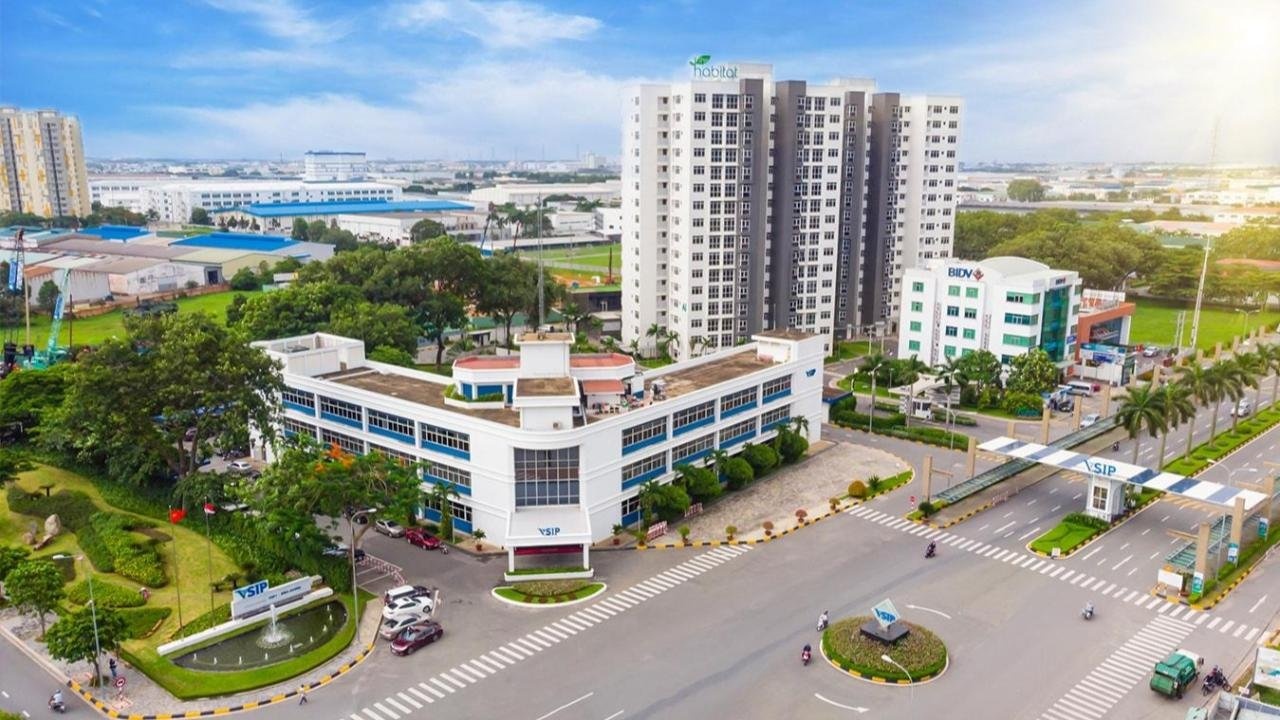Industrial arena meeting greener requirements
 |
| VSIP I in Binh Duong. Photo: VSIP |
At the Vietnam Industrial Property Forum 2022 last week, Pham Hong Diep, chairman of Shinec, the developer of Nam Cau Kien Industrial Park, said that the park was born based on the differences and desire for green factors.
“We aim to make this project not just an industrial park (IP) but a centre for the economy, culture, and society of the local province,” Diep said. “An IP must be in line with the master plan of the local city and combines planning and land laws,” Diep added.
To make industrial property projects more successful, policymakers need to research and combine all related laws of investment, planning, land, environment, and civil code together to have solid support for developers to make their parks greener, according to Diep.
Nam Cau Kien is built and operated in accordance with the standards of applying a circular economy, with a management system and many specific measures to reduce resource exploitation, reduce waste, and improve environmental protection.
“The results of the implementation process have helped Nam Cau Kien promote many advantages in economic development and environmental management, provide a good working environment for workers in the park, and attract the attention of employees. The sustainable development of enterprises goes hand-in-hand with the harmonious development of society,” Diep said.
Established in 2008, Nam Cau Kien IP has an area of about 263 hectares. So far, the first phase has been completed at a scale of 103ha, and phase 2 is currently being deployed in order to attract more than 50 domestic and international investors.
Meanwhile, Thai giant Amata Group continues to invest with its next project – Long Thanh High-tech Park in the southern province off Dong Nai with $1.6 billion in capital.
Receiving the investment certificate in 2015, the entire project consists of three sub-projects: a 410-ha high-tech IP, an urban development area, and Long Thanh Amata City. The project is now in the phase of infrastructure construction.
The first IP funded by Amata in Dong Nai was established in 2015, with the occupancy rate now reported to be nearly 100 per cent. The group also started construction of Song Khoai IP in the northern province of Quang Ninh in 2018 with an investment of $232 million and a scale of 123ha. This project was put into operation in2020.
VSIP I park, funded through a joint venture between Becamex IDC Corporation and Sembcorp Industries Corporation, is considered one of the outstanding industrial parks in Vietnam thanks to its international standard operation and management system. After 25 years of operation, the IP is 100 per cent covered with a total investment capital of about $3.2 billion across 230 projects.
From that success, VSIP II, established in 2006, has expanded its scale to more than 2,000ha and the investor has oriented the development planning of IPs and urban centres from the very beginning. Currently, VSIP II has completed infrastructure construction, filling 99 per cent of the IP area, attracting nearly 340 industrial projects with the total investment of about $5 billion.
VSIP III started construction in March this year with 1,000ha and capital of $278 million. The third park marks a new milestone for the developer, as the project implements a strategic transformation towards more sustainable development with a design to integrate smart technology in activities at the park, from energy use, water, and waste treatment, to traffic management and security.
Many industrial developers are also starting the race to form a new industrial lifestyle. In which, the industry will continue to be the centre while the city and services will be completed as a satellite city, clean energy, renewable energy, and circular economy will be given priority to ensure sustainable development.
Regardless of the goals, the issues of occupational safety, environmental friendliness, and social security are still at the core. This is also one of the key criteria to attract top enterprises into the country. For example, LEGO Group chose VSIP III because it could meet their green requirements. Vice president Preben Elnef said this group has tried to make the project sustainable by using renewable energy such as solar roofs and solar fields to ensure carbon neutrality in the factory.
Gaw NP Capital, another industrial real estate developer, signed an MoU in March with United Overseas Bank Vietnam on a financial support agreement for GNP Yen Binh 2 Project (Thai Nguyen) and GNP Nam Dinh Vu Project (Haiphong) to develop green, high-tech, and innovative IPs. This investment fund signed a second MoU in March with REE Group to promote clean energy development through its commitment to install solar panels on 90ha of roof area of GNP’s projects in Vietnam.
What the stars mean:
★ Poor ★ ★ Promising ★★★ Good ★★★★ Very good ★★★★★ Exceptional
 Tag:
Tag:
Related Contents
Latest News
More News
- Sembcorp Development secures licence for VSIP in Khanh Hoa (December 31, 2025 | 18:54)
- Prodezi Long An advances towards integrated eco-centric industrial park model (December 26, 2025 | 11:16)
- Amata to develop $185 million Amata City Phu Tho (December 23, 2025 | 17:49)
- Work starts on Nhat Ban – Haiphong Industrial Zone Phase 2 (December 19, 2025 | 16:43)
- Becamex – Binh Phuoc drives sustainable industrial growth (November 28, 2025 | 15:22)
- South Korean investors seek clarity on IP lease extensions (November 24, 2025 | 17:48)
- CEO shares insights on Phu My 3 IP’s journey to green industrial growth (November 17, 2025 | 11:53)
- Business leaders give their views on ESG compliance in industrial parks (November 15, 2025 | 09:00)
- Industrial parks pivot to sustainable models amid rising ESG demands (November 14, 2025 | 11:00)
- Amata plans industrial park in Ho Chi Minh City (November 04, 2025 | 15:49)

![[Infographic] AMATA: Industrial and Smart City Developer](https://vir.com.vn/stores/news_dataimages/2026/022026/12/16/croped/amata-industrial-and-smart-city-developer-20260212165823.jpg?260212050401)

















 Mobile Version
Mobile Version